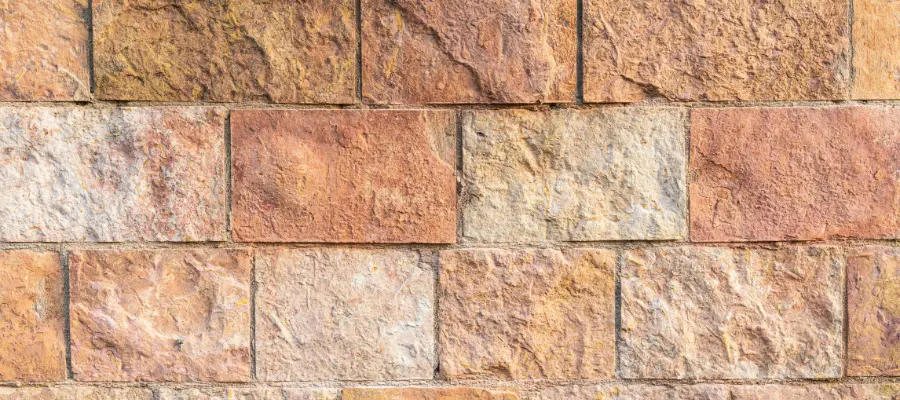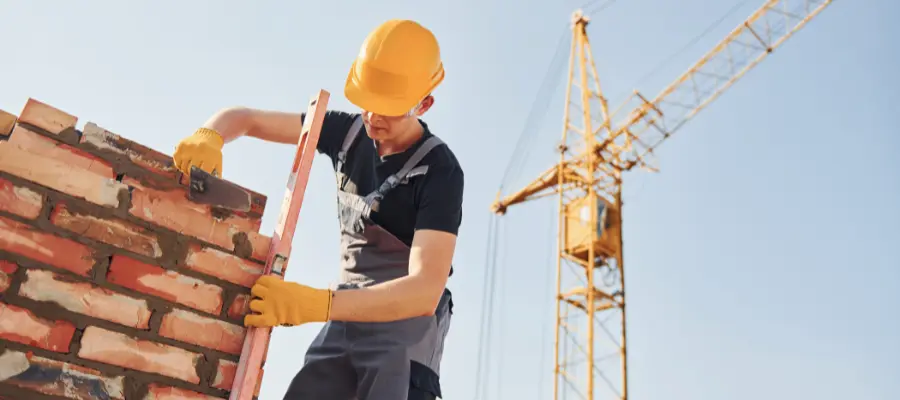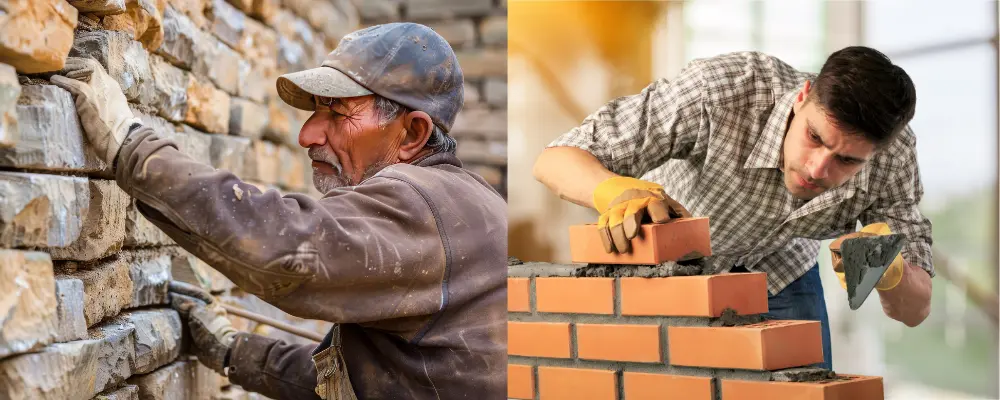It’s hard to decide between brick and stone masonry as they have unique advantages and disadvantages. This blog of Brick & Bolt explores the difference between stone masonry and brick masonry. It covers their materials, types, advantages, and disadvantages and provides a comparison.
- 1 Definition of Masonry
- 2 Types of Masonry
- 3 What is Stone Masonry?
- 4 What is Brick Masonry?
- 5 Major Types of Stone Masonry
- 6 Major Types of Brick Masonry
- 7 Advantages and Disadvantages of Stone Masonry
- 8 Advantages and Disadvantages of Brick Masonry
- 9 Difference Between Stone Masonry and Brick Masonry
- 10 Conclusion
Definition of Masonry
Masonry is the process of placing one masonry unit, such as bricks and stones, concrete blocks, etc., over another with mortar in a regular way to construct a building member.
Types of Masonry
Depending on the materials used, there are numerous types of masonry used in construction. The most common include stone masonry, brick masonry, concrete block masonry, and glass block masonry. In today’s blog, we discuss the difference between stone masonry and brick masonry.
What is Stone Masonry?

Stone masonry is a type of construction that utilises mortar and stones on masonry. Stone masonry materials are natural rocks like limestone, sandstone, marble, slate, fieldstone or granite that are cut and prepared into proper shapes for stone masonry construction. It is used for foundations, floors, arches, stairs, walls, retaining walls, and columns. Stones are among the most durable and strong building materials in India.
While stone masonry can serve as an excellent cladding material, there are various other options for exterior cladding applications. You can explore the best cladding materials for your home in this comprehensive guide.
What is Brick Masonry?
Brick masonry involves arranging bricks in mortar to construct structures. There are various types of bricks used in construction, each with unique properties and suitable applications, which come together in brick masonry to create sturdy and durable structures.
Major Types of Stone Masonry
Major types of stone masonry are
- Rubble Stone Masonry
- Ashlar Masonry
- Square rubble masonry
Rubble Stone Masonry
Rubble masonry is the simplest type of stone masonry. It uses stones exactly as they are found in nature, without any cutting or shaping. The joints between the stones are wide because the stones are irregular and uneven. This method is the most economical because it uses stones in their natural, unrefined state.
Ashlar Masonry
Ashlar masonry uses stones that are neatly cut into smooth, consistent shapes and sizes. The stones are precisely cut and prepared, giving the masonry a polished, formal, and grand appearance that looks very impressive. However, because cutting and shaping each individual stone takes a lot of skilled work and effort, ashlar masonry is more expensive than rubble masonry.
Square Rubble Masonry
Squared stone masonry concerns working the stones to ensure that all the corners are square and levelled. This gives the work a very accurate and clean look.
Major Types of Brick Masonry

Major types of brick masonry are
1. Brick Masonry with Mud
2. Cement Brickwork
Brick Masonry with Mud
In mud brick masonry, mud acts as the mortar. Bricks are held together with a mud mixture, which is more flexible than cement mortar.
Cement Brickwork
In cement brickwork, bricks are placed using cement mortar. The arrangement of bricks in different patterns, known as bonds, is an important aspect of brick masonry construction, and there are various types of brick bonds used in this technique. This type of brick masonry creates buildings that are strong, stable, and long-lasting. The mortar used in cement brickwork, which is a mixture of cement and sand, plays a crucial role in the strength and durability of the construction.
Advantages and Disadvantages of Stone Masonry
Advantages of Stone Masonry
- Stone masonry buildings are extremely durable and long-lasting when high-quality stone is used.
- Fire resistant and able to withstand weathering over centuries.
- The natural appearance of stone adds beauty.
- Good insulating properties to regulate interior temperatures.
Disadvantages of Stone Masonry
- Stone masonry will be expensive because it demands skilled labour and quality stones.
- Stone masonry buildings are difficult to modify once constructed.
- In stone masonry buildings, weight requires extremely strong foundations.
- The masonry stone supply is limited.
Advantages and Disadvantages of Brick Masonry
Advantages of Brick Masonry
- Bricks are more affordable and easily obtainable than quality stone
- Manufacturing ensures consistently sized units of bricks for efficient construction
- Brick masonry is extremely strong and durable, like stone masonry
- Bricks can be moulded into various colours, textures, and shapes
When undertaking brick masonry construction, especially for residential projects, it’s crucial to accurately determine the required quantities of materials, including plastering.
Disadvantages of Brick Masonry
- Not as aesthetically unique looking as natural stone masonry
- Skilled labour is still required to properly bond and lay bricks
- Exterior brick can crack from moisture if not sealed
- Fire resistance is lower than stone masonry
When considering brick masonry construction, particularly with cement bricks, it’s essential to familiarise yourself with the different types, sizes, advantages, and costs involved.
Difference Between Stone Masonry and Brick Masonry
| Stone Masonry | Brick Masonry | |
| Appearance | Stone masonry can be different colours depending on the stones used. Hence, it is used for buildings where architecture demands heavy mouldings with large projections. | Brick masonry is usually red. It is used for colossal works, temples, bridges, etc. |
| Strength | Since stones will be irregular in shape, obtaining a proper bond in stone masonry is difficult, and the bond is less strong. A dead load of stone masonry is also higher. | Since bricks are regular and uniform in shape, proper bonds can be easily obtained, thus providing better strength. The dead load of brick masonry is less. |
| Durability | The life of stone masonry is higher as compared to brick masonry. | Fairly durable and has a moderately long life. |
| Cost of Construction | More costly | More economical than stone masonry |
| Maintenance Cost | More costly | Cheaper |
| Fire Resistance | Higher fire-resistance | Fair fire-resistance |
| Availability | Stones are naturally made and obtained from quarries. | Bricks are made up of using clay. |
| Handling | Handling is difficult. | Handling is simple. |
While both stone masonry and brick masonry offer decent fire resistance, there are other building materials that excel in this aspect.
Conclusion
After considering the difference between stone masonry and brick masonry, both have unique advantages and disadvantages. Stone masonry offers unmatched durability, natural beauty, and fire resistance. However, it costs more due to the need for skilled labour and limited stone supplies. Brick masonry is more affordable, uniform in sizing, and relatively strong and durable, though not quite to the level of quality stonework. Ultimately, the choice between stone and brick masonry will depend on the specific project requirements, desired aesthetics, budget constraints, and engineering needs. Careful consideration of the advantages and disadvantages of each is essential for choosing the best fit for any modern masonry construction project.

